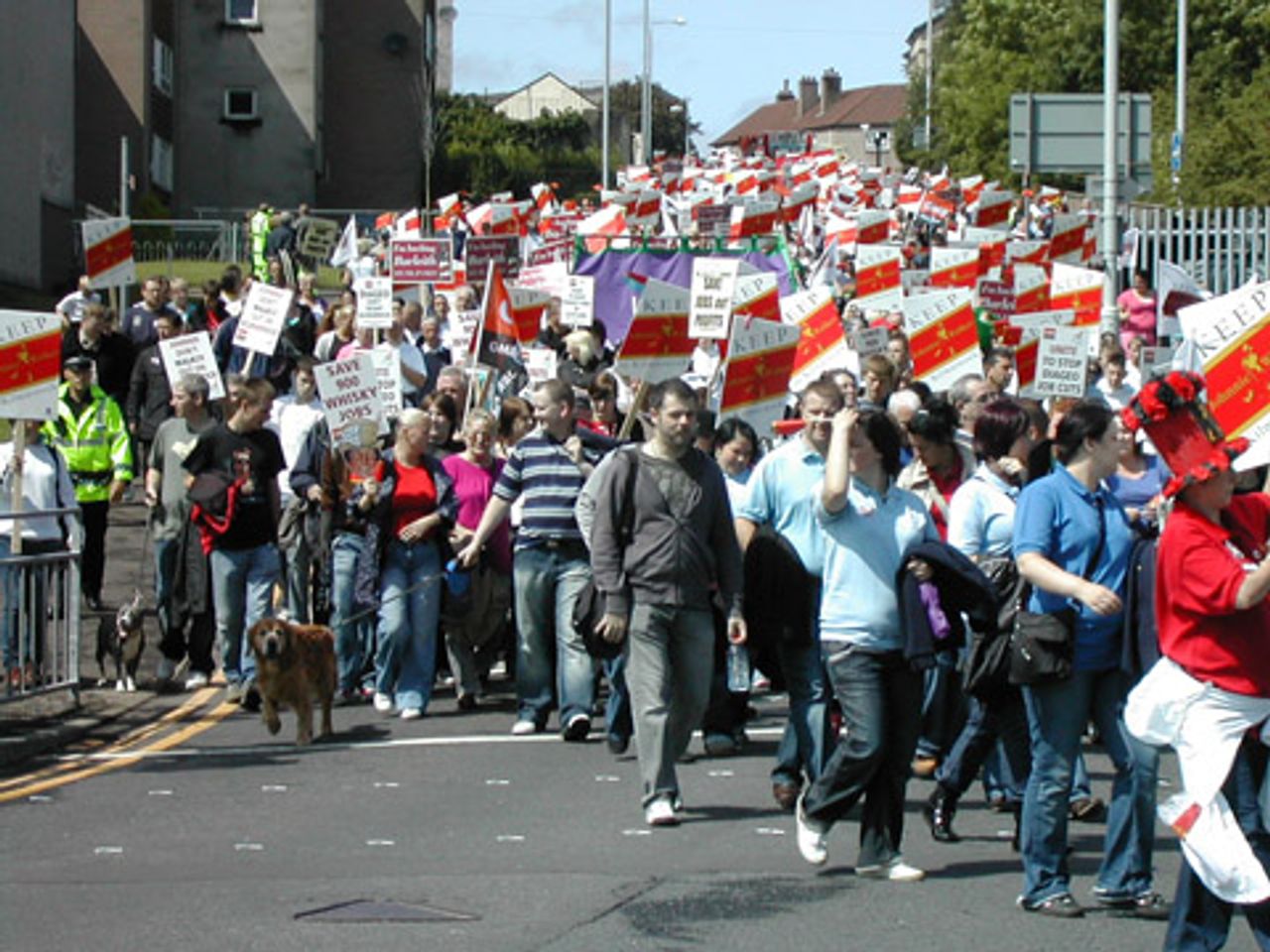 Demonstration passes through Kilmarnock
Demonstration passes through KilmarnockAround 20,000 people demonstrated in Kilmarnock July 26 against the planned closure of the Johnnie Walker’s whisky bottling plant by the major drinks trans-national Diageo. The huge turnout, almost half Kilmarnock’s 44,000 residents, reflects deep concerns over the loss of some 700 jobs. The bottling plant is one of the largest employers in East and North Ayrshire, areas that are beginning to suffer seriously from the deepening recession, where decently paid work has been difficult to find for decades.
Diageo also intends to close a distillery at Port Dundas, Glasgow, where 140 jobs are threatened. Distribution workers at Hurlford—a small town just outside Kilmarnock—face being transferred to Linwood, 30 miles away, with potential loss of earnings and pension rights. The moves are part of Diageo’s plan to consolidate the bottling of several spirits—whisky, vodka, gin—into two plants in Scotland, at Shieldhall in Glasgow and Leven in Fife, closing the Kilmarnock plant, which only bottles Johnnie Walker’s whisky. A further 30 jobs are under threat at Shieldhall, which currently employs 500 workers.
The moves are in addition to a £200 million “restructuring” programme outlined by the company in February, which includes slashing 1,000 jobs from its global workforce of 23,000. Some 107 jobs are under threat in Ireland, while Diageo’s HQ in London is also undergoing re-organisation. The firm made £2 billion profit last year.
The political parties represented on the march and at the platform rally have no intention of mounting a struggle against Diageo and its cost-cutting measures. Instead, the Scottish National Party, Labour, the trade unions, local authorities and Scottish Enterprise, pledged to work with Diageo on an “alternative business plan”.
This plan has yet to be finalised. SNP leader Alex Salmond has been in talks with the company and has spoken vaguely of being prepared to use public funding to keep jobs in Scotland. Speaking prior to the march he stated, “We want something that comes forward which is acceptable to the Scottish community, but meets the financial objectives of Diageo as a company—it’s the balance between the two”.
Since the “financial objectives” of Diageo are to maximise its profits, the threat of job losses and rationalisation are not off the table. A debate in the Scottish Parliament on the proposed closure is not scheduled until its resumption on September 2.
In the meantime, public opposition to the cuts is being subordinated to moral appeals to Diageo’s executives. Salmond told the rally that Walker’s closure was not “socially acceptable”. Commenting on the two centuries of efforts put in by Kilmarnock workers in the Walker’s plant, he asked, “If this workforce is so loyal to the product, then why can’t Diageo be loyal to the workforce and to this community?”
To emphasise loyalty to the “product”, the all-party campaign had emblazoned Johnnie Walker’s logos on thousands of placards
The trade unions slogan for the campaign is to “Keep Diageo jobs in Scotland”. UNITE union official, Len McCluskey argued that Johnnie Walker’s workers had displayed “loyalty passed through generations and have developed the worldwide brand. Diageo need to think again and take a step back. If they want that reputation to stay intact, they need to talk to us.”
McCluskey combined his appeals to workers’ loyalty with empty promises of an international campaign. “We will take this fight to every plant and every country where Diageo operate”, he claimed. “We’ll be organising meetings with the UK Diageo plants, plants in Ireland, America and the rest of Europe. If Diageo don’t listen to us, then they’ll get the fight of their life”.
McCluskey ended his speech with the appeal, “My message is believe. Believe in your unions, believe in your communities, believe in your values because together we will win and justice will prevail”.
No one should believe any such thing. It is entirely excluded that UNITE will organise a genuine struggle, either in Scotland or internationally. With unemployment across the UK rising rapidly, to 2.4 million in May, the trade unions have stood by as jobs are destroyed.
John Quigley of UNITE made clear where the bureaucracy’s real commitment lies. He frankly celebrated the unions’ role in increasing profitability and its long standing alliance with Diageo.
“We’ve been looking at alternative ways of working, increasing productivity in Diageo over 20 years. They made $1.6 billion to the end of June, and that is because of the sacrifices and the increases in productivity that our members and members of the GMB have made over the years, to make Diageo the most successful drinks company in the world”.
Other speakers took up the same theme. Local Labour MP Des Browne demanded that investment agency Scottish Enterprise put together an alternative plan as soon as possible. Diageo, Brown assured, had promised to give the plan a “fair hearing”.
Harry Donaldson, Scottish regional secretary of the GMB union, flew a protectionist kite calling for “bottled in Scotland” to be made a legal requirement for Scotch whisky.
Diageo workers and all those dependent on Diageo for their livelihood should have no confidence whatsoever in this grovelling pro-corporate campaign. The ability of vast and highly profitable corporations to re-organise production to take advantage of economies of scale and a global division of labour cannot be counteracted on a national or regional basis.
Only through a struggle against globally organised corporations, based on uniting workers in the fight to re-organise economic life on the basis of social need, not profit can defend jobs and living standards. This means breaking out of the local and national straitjackets imposed by the official parties and the trade unions and developing organisations of genuine class struggle.
The World Socialist Web Site spoke to some of those workers supporting the Kilmarnock demonstration.
 Alice Grant, left, May Bolan
Alice Grant, left, May BolanMay Bolan explained, “I’ve come out to support the workers at Diageo. I only worked at the plant for about a month or two, but a lot of my friends worked there. Look at all the places that have gone from here now. There’s BMK carpets, there’s Massey Ferguson, Glenfield and Kennedy”.
 Catherine McNaugh, left, Rebecca, right
Catherine McNaugh, left, Rebecca, rightCatherine McNaugh said, “My husband has worked at the gate office at the plant for seven years, but he will be laid off as well. If my husband gets laid off we’ll have to sell the house.
“I could understand what they were doing if they weren’t making any money, but they are just going to close and move it to Fife. They should keep it in Kilmarnock. It’s been here since 1820. They are going to build a new bottling plant in Leven in 2011.... They just told the workers about it and that was that.
“Kilmarnock has already lost Glenfield and Kennedy. They have just shut down Vesuvius, which is a big plant just up the road at Newmilns. At Vesuvius 180 workers were paid off, and it just shut down and moved to Poland.
“Newmilns was famous for its lace. There are no lace factories left in the Irvine Valley. I worked in a lace plant that was here for 100 years, and that was shut down. There is no manufacturing at all now in Scotland. If Johnnie Walker’s goes from Kilmarnock, all the shops and everything are going to shut down.
“There are no jobs at all for the next generation. There’s going to be nothing left. It will be a dead town. All the people will need to sell their houses. It will be just terrible, devastating”.
Rebecca said, “Kilmarnock is one of the biggest profit making sites for them. So we the workers in Kilmarnock just can’t understand why they are doing this. We have only one line that isn’t used.
“They are saying they are doing away with 10 lines between the three sites, and for them the best thing is to close Kilmarnock and take it to Leven. Only one line is going to Shieldhall, the rest are going to Leven. Diageo is having to build a new complex onto Leven to accommodate this.
“We actually do specialist work, which is a big profit thing for them. They are going to have to train those people to do this specialist job. My actual line was built and brought over from Italy, so I was trained by a person from Italy. I also went over to Italy.
“We were under the impression it was due to the credit crunch, but for sure the way it's turned out its absolutely nothing to do with the credit crunch. They are making a huge profit. The union are saying there is a lot of hope. They are finding lots of flaws [in the company’s proposals]. Lack of planning permission and things like that. I don’t know if there’s any truth in that. But that’s what they are telling us”.
Alison Grant said, “I worked there 34 years and I had to take early retirement from the plant. Next year I would have been doing my fortieth year. It’s a big loss for the people of Kilmarnock and all the supporting industries. This is going to kill communities”.
Subscribe to the IWA-RFC Newsletter
Get email updates on workers’ struggles and a global perspective from the International Workers Alliance of Rank-and-File Committees.
